MBA401: Culture, Leadership, and Talent Management Reflection Report
VerifiedAdded on 2023/01/05
|12
|3190
|47
Report
AI Summary
This report provides a reflective analysis of culture, leadership, and talent management within organizations. It explores the interplay between organizational culture, leadership styles, and talent management strategies, drawing on concepts from the MBA401 course. The report discusses key elements such as employee engagement, performance management, and talent retention, highlighting their impact on organizational effectiveness. It also examines different types of organizational culture (power, role, task, and person) and their influence on operational flow. The author reflects on the importance of leadership in motivating employees, fostering engagement, and driving strategic goals. The report emphasizes the significance of talent management, including the role of job learning, retention programs, and employee engagement in achieving organizational objectives and maintaining a healthy work environment. The author also examines the role of leadership in delegating leaders and reducing employee turnover. The analysis incorporates insights gained from lectures, readings, and a guest speaker, providing a comprehensive overview of the subject matter.
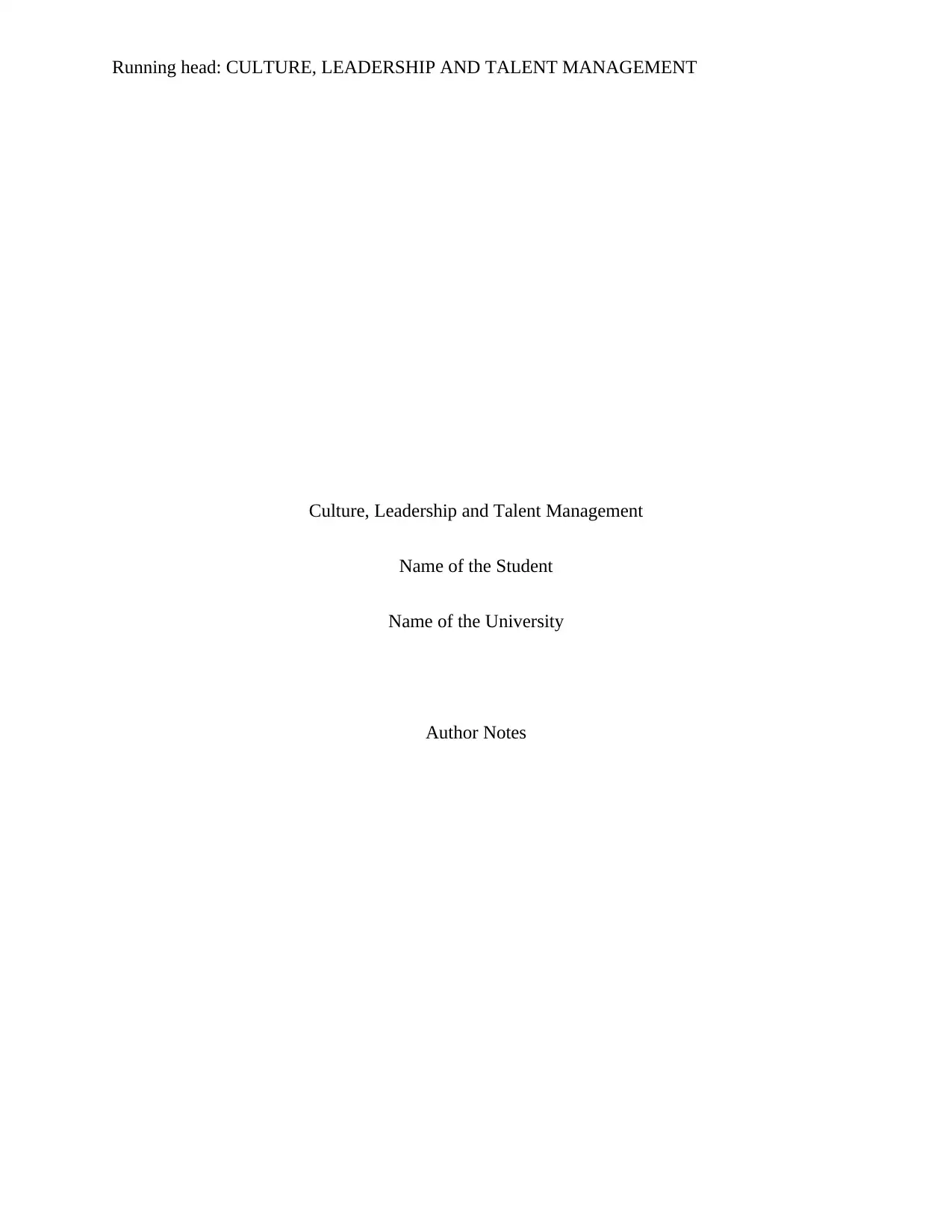
Running head: CULTURE, LEADERSHIP AND TALENT MANAGEMENT
Culture, Leadership and Talent Management
Name of the Student
Name of the University
Author Notes
Culture, Leadership and Talent Management
Name of the Student
Name of the University
Author Notes
Paraphrase This Document
Need a fresh take? Get an instant paraphrase of this document with our AI Paraphraser
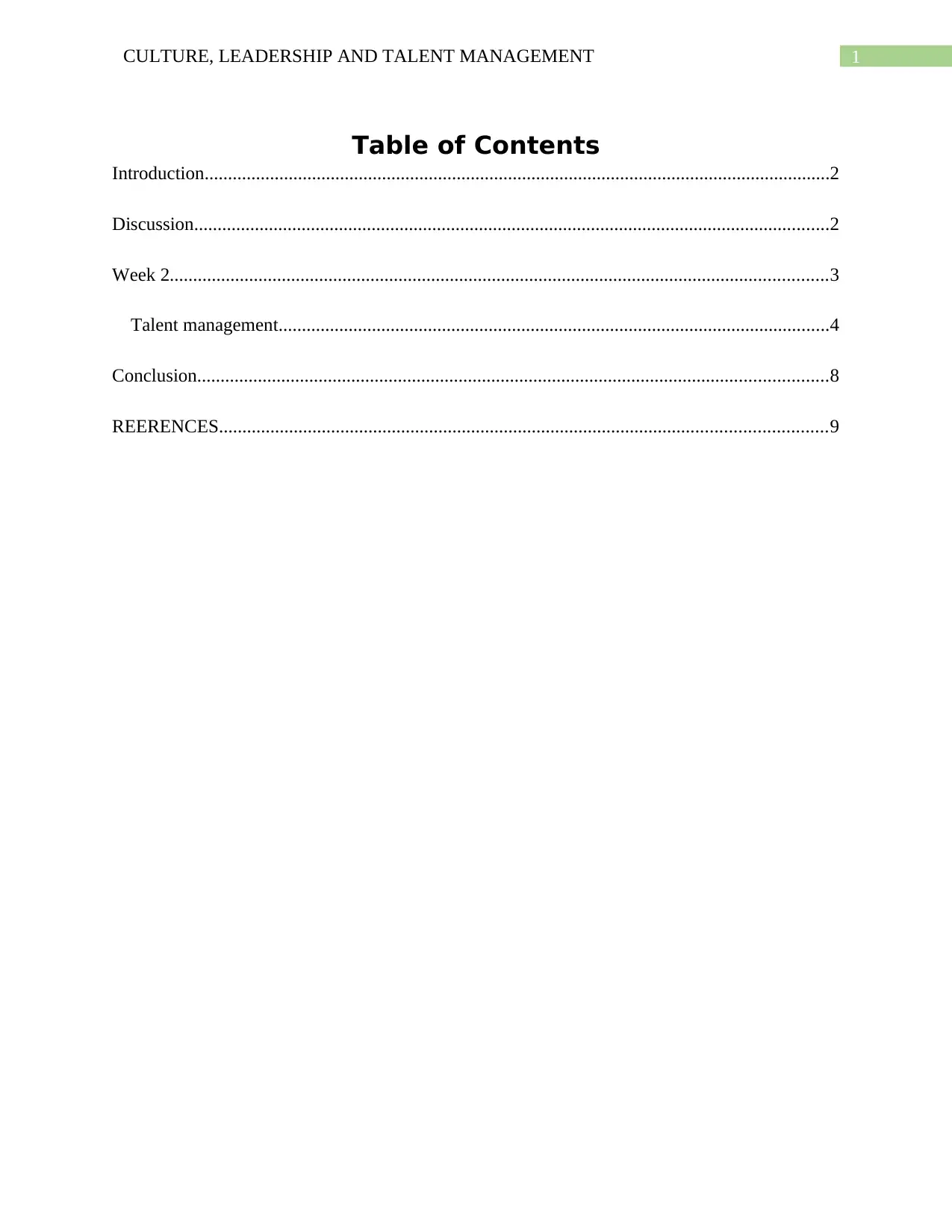
1CULTURE, LEADERSHIP AND TALENT MANAGEMENT
Table of Contents
Introduction......................................................................................................................................2
Discussion........................................................................................................................................2
Week 2.............................................................................................................................................3
Talent management......................................................................................................................4
Conclusion.......................................................................................................................................8
REERENCES..................................................................................................................................9
Table of Contents
Introduction......................................................................................................................................2
Discussion........................................................................................................................................2
Week 2.............................................................................................................................................3
Talent management......................................................................................................................4
Conclusion.......................................................................................................................................8
REERENCES..................................................................................................................................9
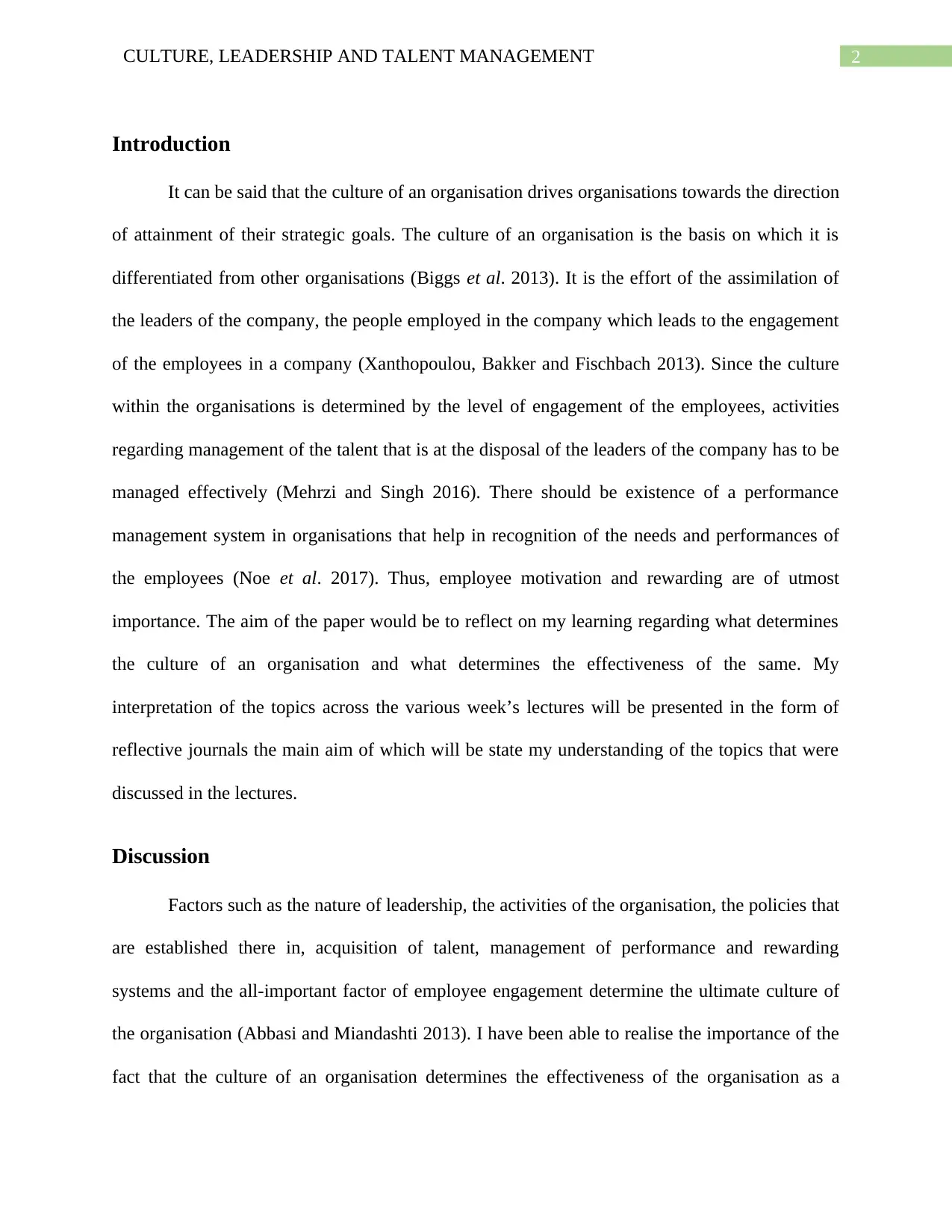
2CULTURE, LEADERSHIP AND TALENT MANAGEMENT
Introduction
It can be said that the culture of an organisation drives organisations towards the direction
of attainment of their strategic goals. The culture of an organisation is the basis on which it is
differentiated from other organisations (Biggs et al. 2013). It is the effort of the assimilation of
the leaders of the company, the people employed in the company which leads to the engagement
of the employees in a company (Xanthopoulou, Bakker and Fischbach 2013). Since the culture
within the organisations is determined by the level of engagement of the employees, activities
regarding management of the talent that is at the disposal of the leaders of the company has to be
managed effectively (Mehrzi and Singh 2016). There should be existence of a performance
management system in organisations that help in recognition of the needs and performances of
the employees (Noe et al. 2017). Thus, employee motivation and rewarding are of utmost
importance. The aim of the paper would be to reflect on my learning regarding what determines
the culture of an organisation and what determines the effectiveness of the same. My
interpretation of the topics across the various week’s lectures will be presented in the form of
reflective journals the main aim of which will be state my understanding of the topics that were
discussed in the lectures.
Discussion
Factors such as the nature of leadership, the activities of the organisation, the policies that
are established there in, acquisition of talent, management of performance and rewarding
systems and the all-important factor of employee engagement determine the ultimate culture of
the organisation (Abbasi and Miandashti 2013). I have been able to realise the importance of the
fact that the culture of an organisation determines the effectiveness of the organisation as a
Introduction
It can be said that the culture of an organisation drives organisations towards the direction
of attainment of their strategic goals. The culture of an organisation is the basis on which it is
differentiated from other organisations (Biggs et al. 2013). It is the effort of the assimilation of
the leaders of the company, the people employed in the company which leads to the engagement
of the employees in a company (Xanthopoulou, Bakker and Fischbach 2013). Since the culture
within the organisations is determined by the level of engagement of the employees, activities
regarding management of the talent that is at the disposal of the leaders of the company has to be
managed effectively (Mehrzi and Singh 2016). There should be existence of a performance
management system in organisations that help in recognition of the needs and performances of
the employees (Noe et al. 2017). Thus, employee motivation and rewarding are of utmost
importance. The aim of the paper would be to reflect on my learning regarding what determines
the culture of an organisation and what determines the effectiveness of the same. My
interpretation of the topics across the various week’s lectures will be presented in the form of
reflective journals the main aim of which will be state my understanding of the topics that were
discussed in the lectures.
Discussion
Factors such as the nature of leadership, the activities of the organisation, the policies that
are established there in, acquisition of talent, management of performance and rewarding
systems and the all-important factor of employee engagement determine the ultimate culture of
the organisation (Abbasi and Miandashti 2013). I have been able to realise the importance of the
fact that the culture of an organisation determines the effectiveness of the organisation as a
⊘ This is a preview!⊘
Do you want full access?
Subscribe today to unlock all pages.

Trusted by 1+ million students worldwide
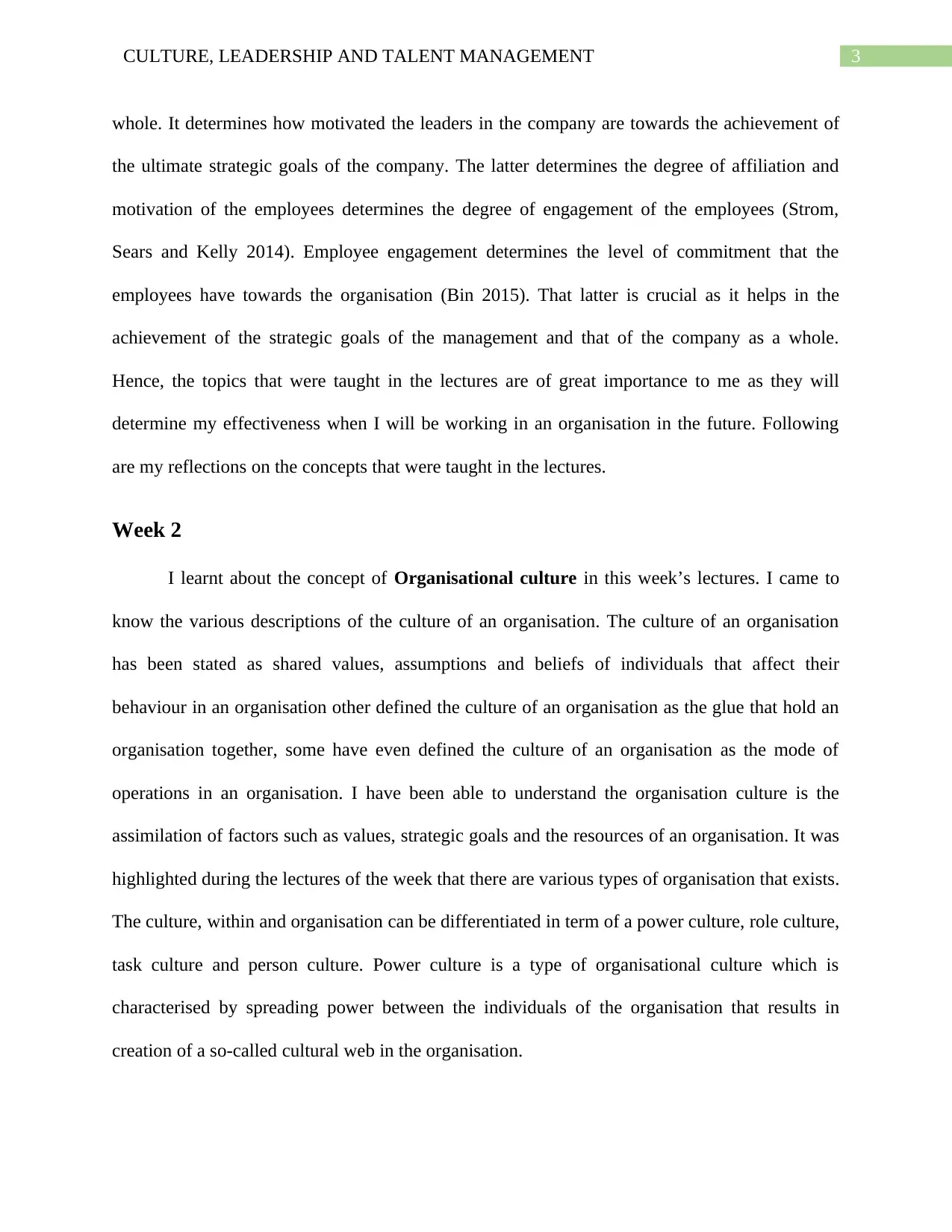
3CULTURE, LEADERSHIP AND TALENT MANAGEMENT
whole. It determines how motivated the leaders in the company are towards the achievement of
the ultimate strategic goals of the company. The latter determines the degree of affiliation and
motivation of the employees determines the degree of engagement of the employees (Strom,
Sears and Kelly 2014). Employee engagement determines the level of commitment that the
employees have towards the organisation (Bin 2015). That latter is crucial as it helps in the
achievement of the strategic goals of the management and that of the company as a whole.
Hence, the topics that were taught in the lectures are of great importance to me as they will
determine my effectiveness when I will be working in an organisation in the future. Following
are my reflections on the concepts that were taught in the lectures.
Week 2
I learnt about the concept of Organisational culture in this week’s lectures. I came to
know the various descriptions of the culture of an organisation. The culture of an organisation
has been stated as shared values, assumptions and beliefs of individuals that affect their
behaviour in an organisation other defined the culture of an organisation as the glue that hold an
organisation together, some have even defined the culture of an organisation as the mode of
operations in an organisation. I have been able to understand the organisation culture is the
assimilation of factors such as values, strategic goals and the resources of an organisation. It was
highlighted during the lectures of the week that there are various types of organisation that exists.
The culture, within and organisation can be differentiated in term of a power culture, role culture,
task culture and person culture. Power culture is a type of organisational culture which is
characterised by spreading power between the individuals of the organisation that results in
creation of a so-called cultural web in the organisation.
whole. It determines how motivated the leaders in the company are towards the achievement of
the ultimate strategic goals of the company. The latter determines the degree of affiliation and
motivation of the employees determines the degree of engagement of the employees (Strom,
Sears and Kelly 2014). Employee engagement determines the level of commitment that the
employees have towards the organisation (Bin 2015). That latter is crucial as it helps in the
achievement of the strategic goals of the management and that of the company as a whole.
Hence, the topics that were taught in the lectures are of great importance to me as they will
determine my effectiveness when I will be working in an organisation in the future. Following
are my reflections on the concepts that were taught in the lectures.
Week 2
I learnt about the concept of Organisational culture in this week’s lectures. I came to
know the various descriptions of the culture of an organisation. The culture of an organisation
has been stated as shared values, assumptions and beliefs of individuals that affect their
behaviour in an organisation other defined the culture of an organisation as the glue that hold an
organisation together, some have even defined the culture of an organisation as the mode of
operations in an organisation. I have been able to understand the organisation culture is the
assimilation of factors such as values, strategic goals and the resources of an organisation. It was
highlighted during the lectures of the week that there are various types of organisation that exists.
The culture, within and organisation can be differentiated in term of a power culture, role culture,
task culture and person culture. Power culture is a type of organisational culture which is
characterised by spreading power between the individuals of the organisation that results in
creation of a so-called cultural web in the organisation.
Paraphrase This Document
Need a fresh take? Get an instant paraphrase of this document with our AI Paraphraser
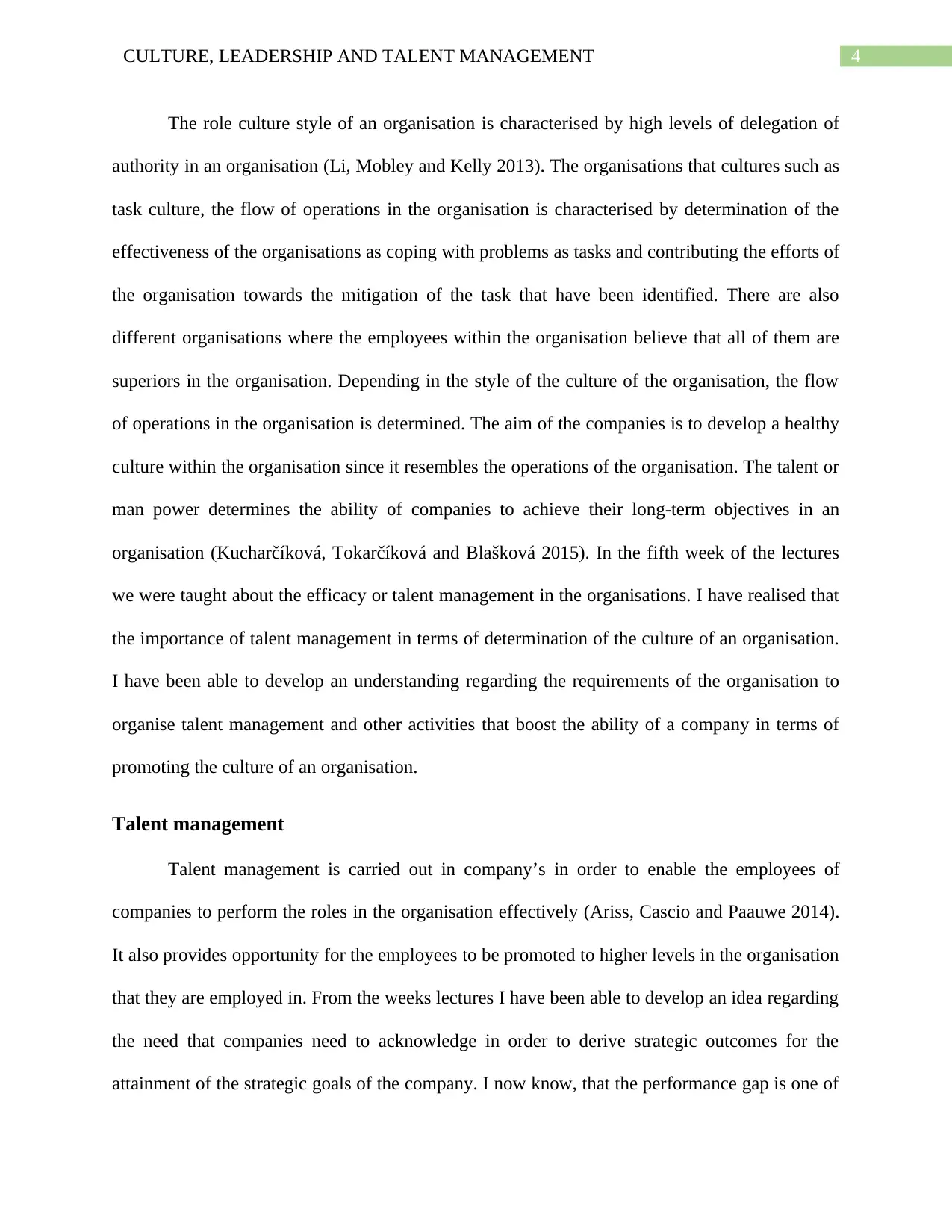
4CULTURE, LEADERSHIP AND TALENT MANAGEMENT
The role culture style of an organisation is characterised by high levels of delegation of
authority in an organisation (Li, Mobley and Kelly 2013). The organisations that cultures such as
task culture, the flow of operations in the organisation is characterised by determination of the
effectiveness of the organisations as coping with problems as tasks and contributing the efforts of
the organisation towards the mitigation of the task that have been identified. There are also
different organisations where the employees within the organisation believe that all of them are
superiors in the organisation. Depending in the style of the culture of the organisation, the flow
of operations in the organisation is determined. The aim of the companies is to develop a healthy
culture within the organisation since it resembles the operations of the organisation. The talent or
man power determines the ability of companies to achieve their long-term objectives in an
organisation (Kucharčíková, Tokarčíková and Blašková 2015). In the fifth week of the lectures
we were taught about the efficacy or talent management in the organisations. I have realised that
the importance of talent management in terms of determination of the culture of an organisation.
I have been able to develop an understanding regarding the requirements of the organisation to
organise talent management and other activities that boost the ability of a company in terms of
promoting the culture of an organisation.
Talent management
Talent management is carried out in company’s in order to enable the employees of
companies to perform the roles in the organisation effectively (Ariss, Cascio and Paauwe 2014).
It also provides opportunity for the employees to be promoted to higher levels in the organisation
that they are employed in. From the weeks lectures I have been able to develop an idea regarding
the need that companies need to acknowledge in order to derive strategic outcomes for the
attainment of the strategic goals of the company. I now know, that the performance gap is one of
The role culture style of an organisation is characterised by high levels of delegation of
authority in an organisation (Li, Mobley and Kelly 2013). The organisations that cultures such as
task culture, the flow of operations in the organisation is characterised by determination of the
effectiveness of the organisations as coping with problems as tasks and contributing the efforts of
the organisation towards the mitigation of the task that have been identified. There are also
different organisations where the employees within the organisation believe that all of them are
superiors in the organisation. Depending in the style of the culture of the organisation, the flow
of operations in the organisation is determined. The aim of the companies is to develop a healthy
culture within the organisation since it resembles the operations of the organisation. The talent or
man power determines the ability of companies to achieve their long-term objectives in an
organisation (Kucharčíková, Tokarčíková and Blašková 2015). In the fifth week of the lectures
we were taught about the efficacy or talent management in the organisations. I have realised that
the importance of talent management in terms of determination of the culture of an organisation.
I have been able to develop an understanding regarding the requirements of the organisation to
organise talent management and other activities that boost the ability of a company in terms of
promoting the culture of an organisation.
Talent management
Talent management is carried out in company’s in order to enable the employees of
companies to perform the roles in the organisation effectively (Ariss, Cascio and Paauwe 2014).
It also provides opportunity for the employees to be promoted to higher levels in the organisation
that they are employed in. From the weeks lectures I have been able to develop an idea regarding
the need that companies need to acknowledge in order to derive strategic outcomes for the
attainment of the strategic goals of the company. I now know, that the performance gap is one of
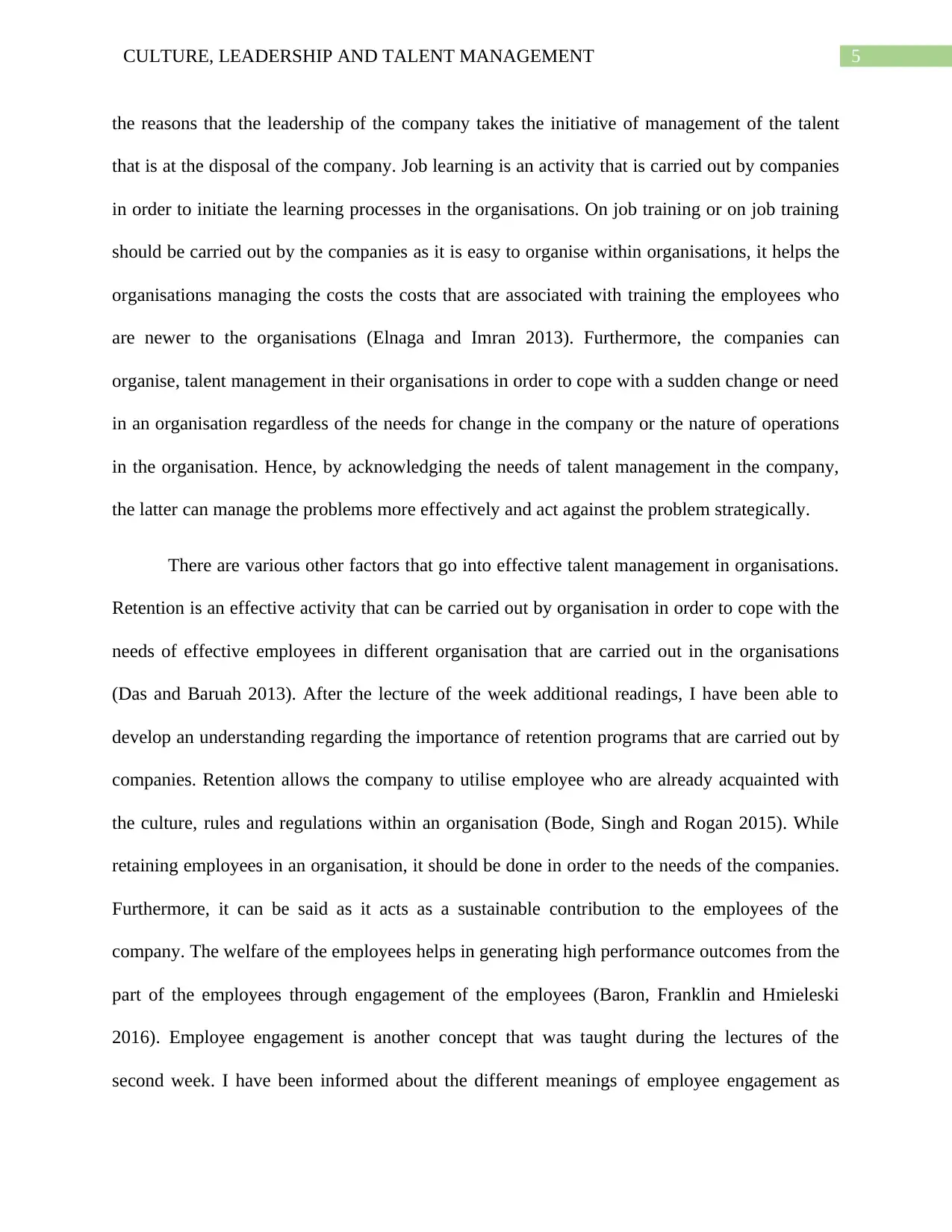
5CULTURE, LEADERSHIP AND TALENT MANAGEMENT
the reasons that the leadership of the company takes the initiative of management of the talent
that is at the disposal of the company. Job learning is an activity that is carried out by companies
in order to initiate the learning processes in the organisations. On job training or on job training
should be carried out by the companies as it is easy to organise within organisations, it helps the
organisations managing the costs the costs that are associated with training the employees who
are newer to the organisations (Elnaga and Imran 2013). Furthermore, the companies can
organise, talent management in their organisations in order to cope with a sudden change or need
in an organisation regardless of the needs for change in the company or the nature of operations
in the organisation. Hence, by acknowledging the needs of talent management in the company,
the latter can manage the problems more effectively and act against the problem strategically.
There are various other factors that go into effective talent management in organisations.
Retention is an effective activity that can be carried out by organisation in order to cope with the
needs of effective employees in different organisation that are carried out in the organisations
(Das and Baruah 2013). After the lecture of the week additional readings, I have been able to
develop an understanding regarding the importance of retention programs that are carried out by
companies. Retention allows the company to utilise employee who are already acquainted with
the culture, rules and regulations within an organisation (Bode, Singh and Rogan 2015). While
retaining employees in an organisation, it should be done in order to the needs of the companies.
Furthermore, it can be said as it acts as a sustainable contribution to the employees of the
company. The welfare of the employees helps in generating high performance outcomes from the
part of the employees through engagement of the employees (Baron, Franklin and Hmieleski
2016). Employee engagement is another concept that was taught during the lectures of the
second week. I have been informed about the different meanings of employee engagement as
the reasons that the leadership of the company takes the initiative of management of the talent
that is at the disposal of the company. Job learning is an activity that is carried out by companies
in order to initiate the learning processes in the organisations. On job training or on job training
should be carried out by the companies as it is easy to organise within organisations, it helps the
organisations managing the costs the costs that are associated with training the employees who
are newer to the organisations (Elnaga and Imran 2013). Furthermore, the companies can
organise, talent management in their organisations in order to cope with a sudden change or need
in an organisation regardless of the needs for change in the company or the nature of operations
in the organisation. Hence, by acknowledging the needs of talent management in the company,
the latter can manage the problems more effectively and act against the problem strategically.
There are various other factors that go into effective talent management in organisations.
Retention is an effective activity that can be carried out by organisation in order to cope with the
needs of effective employees in different organisation that are carried out in the organisations
(Das and Baruah 2013). After the lecture of the week additional readings, I have been able to
develop an understanding regarding the importance of retention programs that are carried out by
companies. Retention allows the company to utilise employee who are already acquainted with
the culture, rules and regulations within an organisation (Bode, Singh and Rogan 2015). While
retaining employees in an organisation, it should be done in order to the needs of the companies.
Furthermore, it can be said as it acts as a sustainable contribution to the employees of the
company. The welfare of the employees helps in generating high performance outcomes from the
part of the employees through engagement of the employees (Baron, Franklin and Hmieleski
2016). Employee engagement is another concept that was taught during the lectures of the
second week. I have been informed about the different meanings of employee engagement as
⊘ This is a preview!⊘
Do you want full access?
Subscribe today to unlock all pages.

Trusted by 1+ million students worldwide
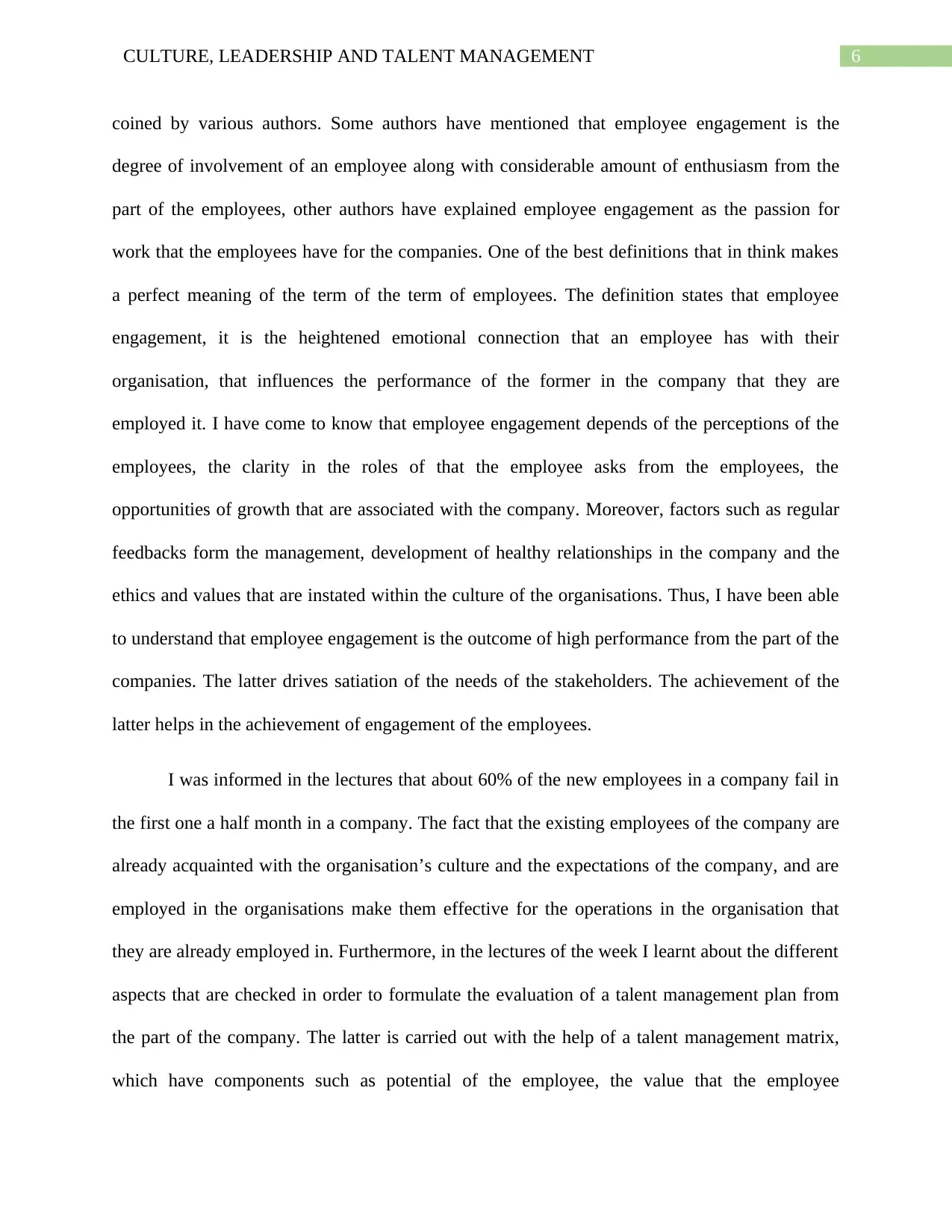
6CULTURE, LEADERSHIP AND TALENT MANAGEMENT
coined by various authors. Some authors have mentioned that employee engagement is the
degree of involvement of an employee along with considerable amount of enthusiasm from the
part of the employees, other authors have explained employee engagement as the passion for
work that the employees have for the companies. One of the best definitions that in think makes
a perfect meaning of the term of the term of employees. The definition states that employee
engagement, it is the heightened emotional connection that an employee has with their
organisation, that influences the performance of the former in the company that they are
employed it. I have come to know that employee engagement depends of the perceptions of the
employees, the clarity in the roles of that the employee asks from the employees, the
opportunities of growth that are associated with the company. Moreover, factors such as regular
feedbacks form the management, development of healthy relationships in the company and the
ethics and values that are instated within the culture of the organisations. Thus, I have been able
to understand that employee engagement is the outcome of high performance from the part of the
companies. The latter drives satiation of the needs of the stakeholders. The achievement of the
latter helps in the achievement of engagement of the employees.
I was informed in the lectures that about 60% of the new employees in a company fail in
the first one a half month in a company. The fact that the existing employees of the company are
already acquainted with the organisation’s culture and the expectations of the company, and are
employed in the organisations make them effective for the operations in the organisation that
they are already employed in. Furthermore, in the lectures of the week I learnt about the different
aspects that are checked in order to formulate the evaluation of a talent management plan from
the part of the company. The latter is carried out with the help of a talent management matrix,
which have components such as potential of the employee, the value that the employee
coined by various authors. Some authors have mentioned that employee engagement is the
degree of involvement of an employee along with considerable amount of enthusiasm from the
part of the employees, other authors have explained employee engagement as the passion for
work that the employees have for the companies. One of the best definitions that in think makes
a perfect meaning of the term of the term of employees. The definition states that employee
engagement, it is the heightened emotional connection that an employee has with their
organisation, that influences the performance of the former in the company that they are
employed it. I have come to know that employee engagement depends of the perceptions of the
employees, the clarity in the roles of that the employee asks from the employees, the
opportunities of growth that are associated with the company. Moreover, factors such as regular
feedbacks form the management, development of healthy relationships in the company and the
ethics and values that are instated within the culture of the organisations. Thus, I have been able
to understand that employee engagement is the outcome of high performance from the part of the
companies. The latter drives satiation of the needs of the stakeholders. The achievement of the
latter helps in the achievement of engagement of the employees.
I was informed in the lectures that about 60% of the new employees in a company fail in
the first one a half month in a company. The fact that the existing employees of the company are
already acquainted with the organisation’s culture and the expectations of the company, and are
employed in the organisations make them effective for the operations in the organisation that
they are already employed in. Furthermore, in the lectures of the week I learnt about the different
aspects that are checked in order to formulate the evaluation of a talent management plan from
the part of the company. The latter is carried out with the help of a talent management matrix,
which have components such as potential of the employee, the value that the employee
Paraphrase This Document
Need a fresh take? Get an instant paraphrase of this document with our AI Paraphraser
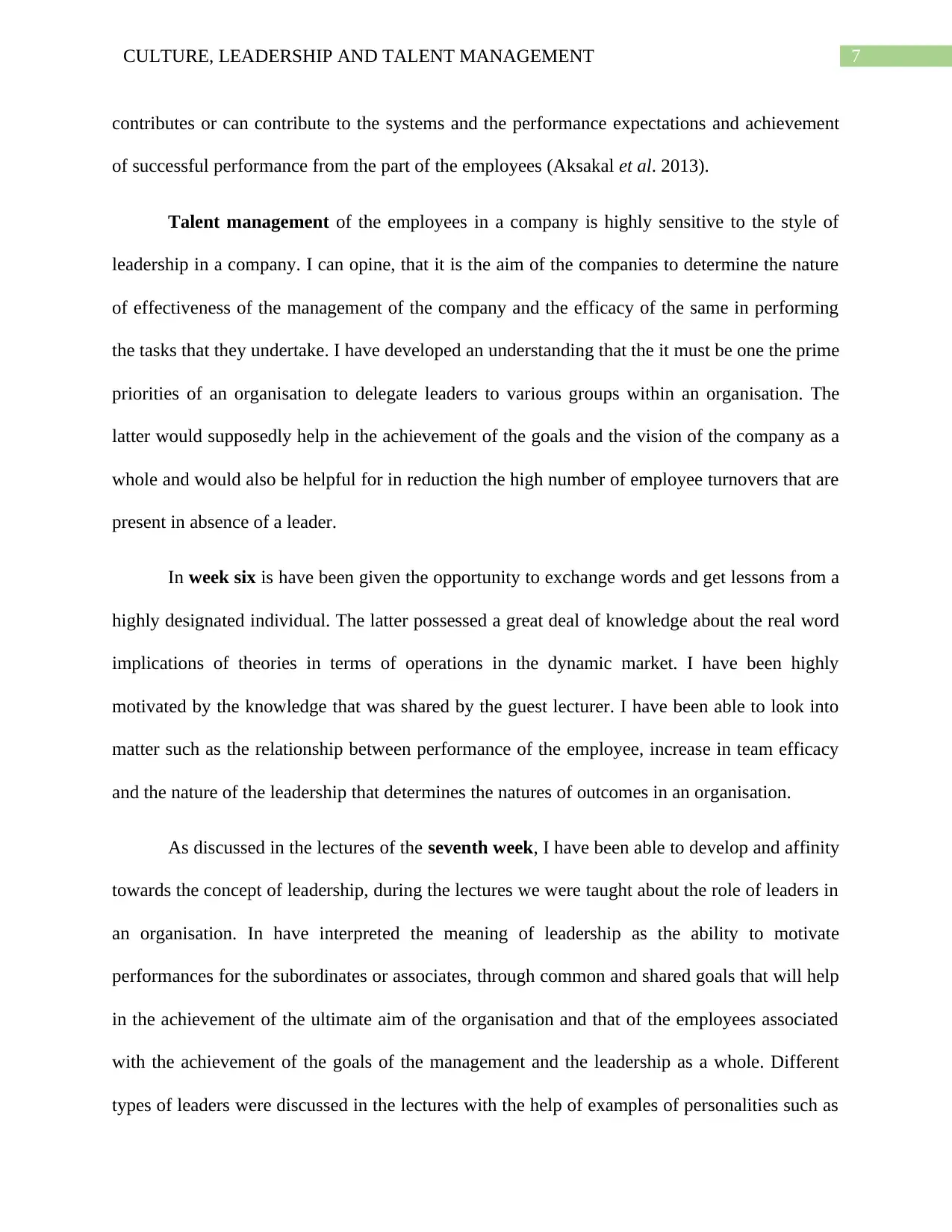
7CULTURE, LEADERSHIP AND TALENT MANAGEMENT
contributes or can contribute to the systems and the performance expectations and achievement
of successful performance from the part of the employees (Aksakal et al. 2013).
Talent management of the employees in a company is highly sensitive to the style of
leadership in a company. I can opine, that it is the aim of the companies to determine the nature
of effectiveness of the management of the company and the efficacy of the same in performing
the tasks that they undertake. I have developed an understanding that the it must be one the prime
priorities of an organisation to delegate leaders to various groups within an organisation. The
latter would supposedly help in the achievement of the goals and the vision of the company as a
whole and would also be helpful for in reduction the high number of employee turnovers that are
present in absence of a leader.
In week six is have been given the opportunity to exchange words and get lessons from a
highly designated individual. The latter possessed a great deal of knowledge about the real word
implications of theories in terms of operations in the dynamic market. I have been highly
motivated by the knowledge that was shared by the guest lecturer. I have been able to look into
matter such as the relationship between performance of the employee, increase in team efficacy
and the nature of the leadership that determines the natures of outcomes in an organisation.
As discussed in the lectures of the seventh week, I have been able to develop and affinity
towards the concept of leadership, during the lectures we were taught about the role of leaders in
an organisation. In have interpreted the meaning of leadership as the ability to motivate
performances for the subordinates or associates, through common and shared goals that will help
in the achievement of the ultimate aim of the organisation and that of the employees associated
with the achievement of the goals of the management and the leadership as a whole. Different
types of leaders were discussed in the lectures with the help of examples of personalities such as
contributes or can contribute to the systems and the performance expectations and achievement
of successful performance from the part of the employees (Aksakal et al. 2013).
Talent management of the employees in a company is highly sensitive to the style of
leadership in a company. I can opine, that it is the aim of the companies to determine the nature
of effectiveness of the management of the company and the efficacy of the same in performing
the tasks that they undertake. I have developed an understanding that the it must be one the prime
priorities of an organisation to delegate leaders to various groups within an organisation. The
latter would supposedly help in the achievement of the goals and the vision of the company as a
whole and would also be helpful for in reduction the high number of employee turnovers that are
present in absence of a leader.
In week six is have been given the opportunity to exchange words and get lessons from a
highly designated individual. The latter possessed a great deal of knowledge about the real word
implications of theories in terms of operations in the dynamic market. I have been highly
motivated by the knowledge that was shared by the guest lecturer. I have been able to look into
matter such as the relationship between performance of the employee, increase in team efficacy
and the nature of the leadership that determines the natures of outcomes in an organisation.
As discussed in the lectures of the seventh week, I have been able to develop and affinity
towards the concept of leadership, during the lectures we were taught about the role of leaders in
an organisation. In have interpreted the meaning of leadership as the ability to motivate
performances for the subordinates or associates, through common and shared goals that will help
in the achievement of the ultimate aim of the organisation and that of the employees associated
with the achievement of the goals of the management and the leadership as a whole. Different
types of leaders were discussed in the lectures with the help of examples of personalities such as
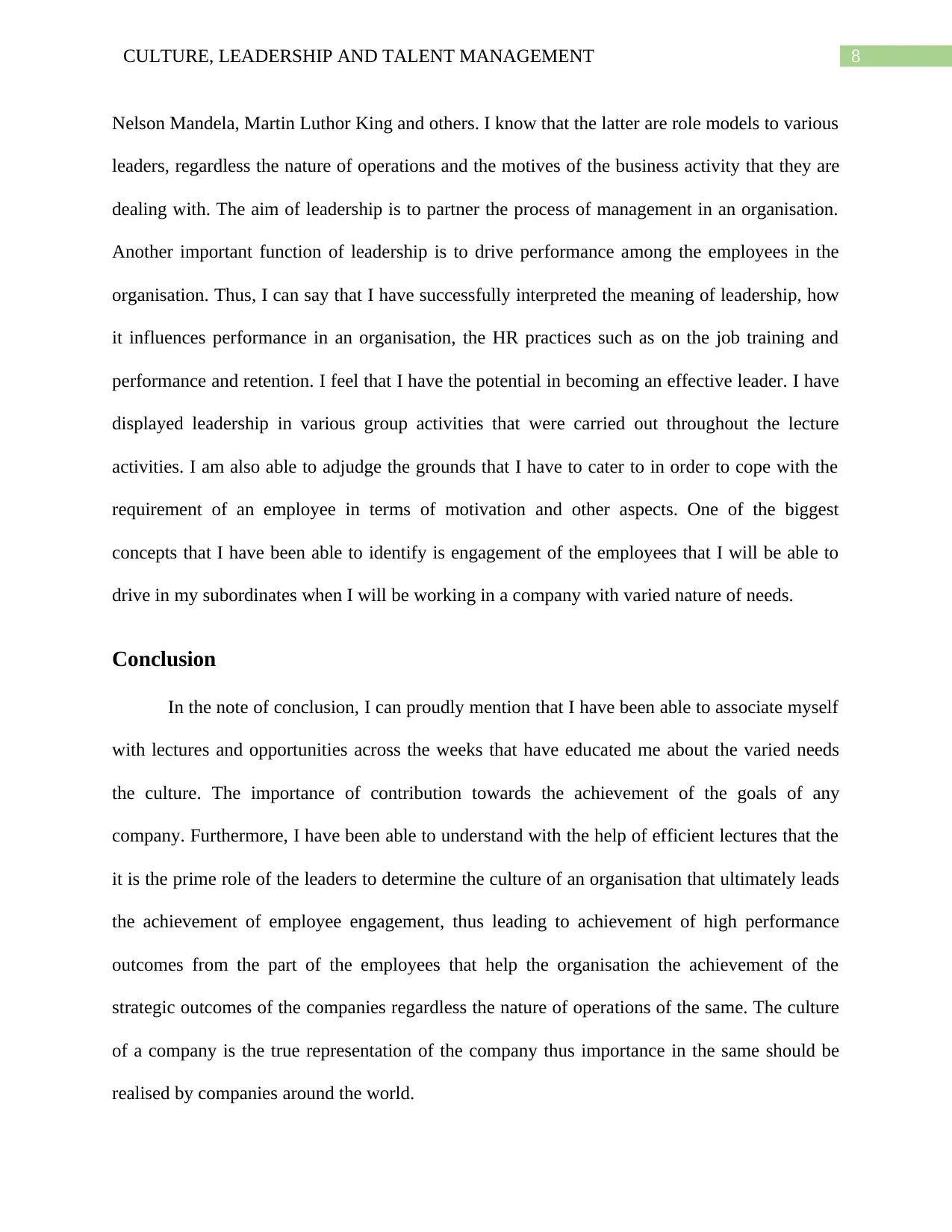
8CULTURE, LEADERSHIP AND TALENT MANAGEMENT
Nelson Mandela, Martin Luthor King and others. I know that the latter are role models to various
leaders, regardless the nature of operations and the motives of the business activity that they are
dealing with. The aim of leadership is to partner the process of management in an organisation.
Another important function of leadership is to drive performance among the employees in the
organisation. Thus, I can say that I have successfully interpreted the meaning of leadership, how
it influences performance in an organisation, the HR practices such as on the job training and
performance and retention. I feel that I have the potential in becoming an effective leader. I have
displayed leadership in various group activities that were carried out throughout the lecture
activities. I am also able to adjudge the grounds that I have to cater to in order to cope with the
requirement of an employee in terms of motivation and other aspects. One of the biggest
concepts that I have been able to identify is engagement of the employees that I will be able to
drive in my subordinates when I will be working in a company with varied nature of needs.
Conclusion
In the note of conclusion, I can proudly mention that I have been able to associate myself
with lectures and opportunities across the weeks that have educated me about the varied needs
the culture. The importance of contribution towards the achievement of the goals of any
company. Furthermore, I have been able to understand with the help of efficient lectures that the
it is the prime role of the leaders to determine the culture of an organisation that ultimately leads
the achievement of employee engagement, thus leading to achievement of high performance
outcomes from the part of the employees that help the organisation the achievement of the
strategic outcomes of the companies regardless the nature of operations of the same. The culture
of a company is the true representation of the company thus importance in the same should be
realised by companies around the world.
Nelson Mandela, Martin Luthor King and others. I know that the latter are role models to various
leaders, regardless the nature of operations and the motives of the business activity that they are
dealing with. The aim of leadership is to partner the process of management in an organisation.
Another important function of leadership is to drive performance among the employees in the
organisation. Thus, I can say that I have successfully interpreted the meaning of leadership, how
it influences performance in an organisation, the HR practices such as on the job training and
performance and retention. I feel that I have the potential in becoming an effective leader. I have
displayed leadership in various group activities that were carried out throughout the lecture
activities. I am also able to adjudge the grounds that I have to cater to in order to cope with the
requirement of an employee in terms of motivation and other aspects. One of the biggest
concepts that I have been able to identify is engagement of the employees that I will be able to
drive in my subordinates when I will be working in a company with varied nature of needs.
Conclusion
In the note of conclusion, I can proudly mention that I have been able to associate myself
with lectures and opportunities across the weeks that have educated me about the varied needs
the culture. The importance of contribution towards the achievement of the goals of any
company. Furthermore, I have been able to understand with the help of efficient lectures that the
it is the prime role of the leaders to determine the culture of an organisation that ultimately leads
the achievement of employee engagement, thus leading to achievement of high performance
outcomes from the part of the employees that help the organisation the achievement of the
strategic outcomes of the companies regardless the nature of operations of the same. The culture
of a company is the true representation of the company thus importance in the same should be
realised by companies around the world.
⊘ This is a preview!⊘
Do you want full access?
Subscribe today to unlock all pages.

Trusted by 1+ million students worldwide
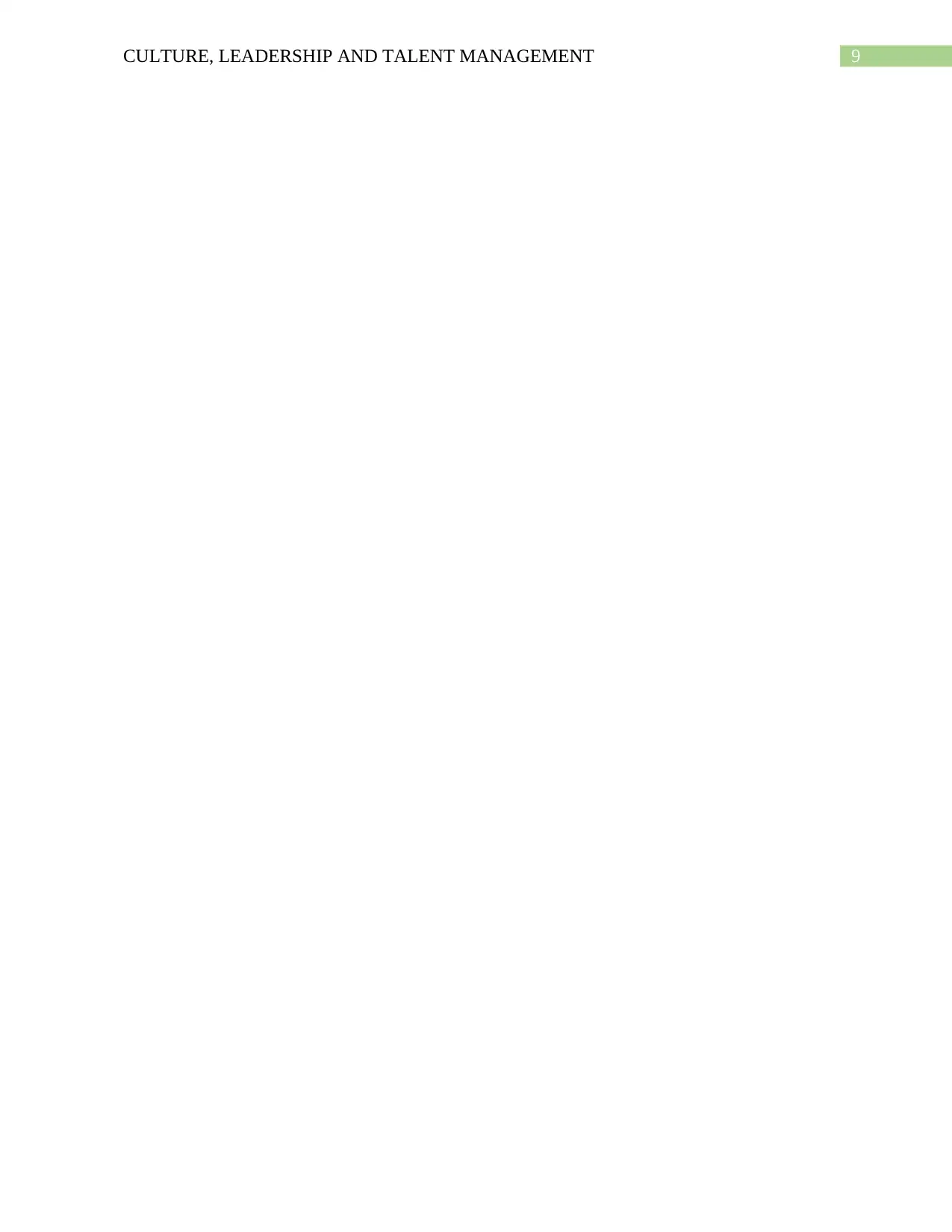
9CULTURE, LEADERSHIP AND TALENT MANAGEMENT
Paraphrase This Document
Need a fresh take? Get an instant paraphrase of this document with our AI Paraphraser
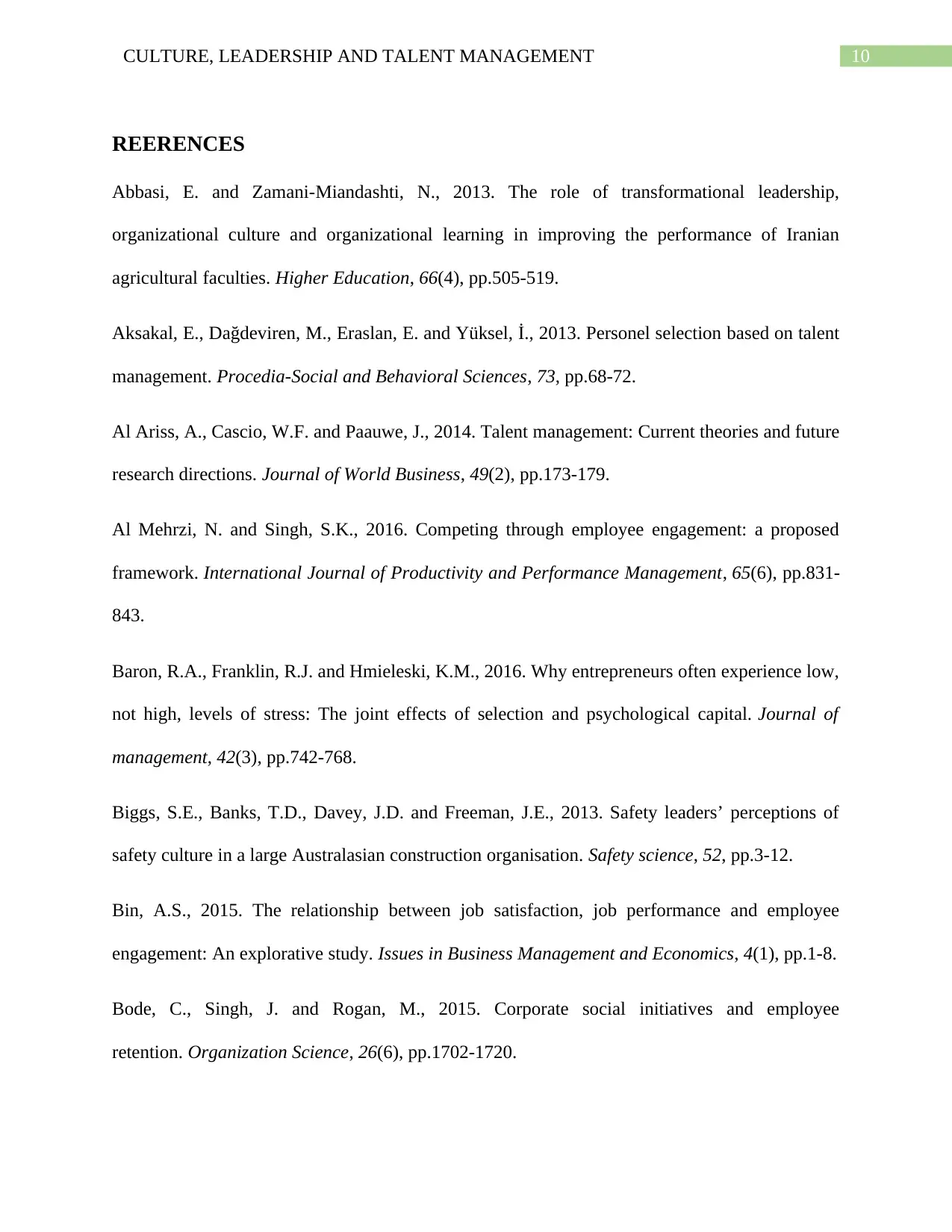
10CULTURE, LEADERSHIP AND TALENT MANAGEMENT
REERENCES
Abbasi, E. and Zamani-Miandashti, N., 2013. The role of transformational leadership,
organizational culture and organizational learning in improving the performance of Iranian
agricultural faculties. Higher Education, 66(4), pp.505-519.
Aksakal, E., Dağdeviren, M., Eraslan, E. and Yüksel, İ., 2013. Personel selection based on talent
management. Procedia-Social and Behavioral Sciences, 73, pp.68-72.
Al Ariss, A., Cascio, W.F. and Paauwe, J., 2014. Talent management: Current theories and future
research directions. Journal of World Business, 49(2), pp.173-179.
Al Mehrzi, N. and Singh, S.K., 2016. Competing through employee engagement: a proposed
framework. International Journal of Productivity and Performance Management, 65(6), pp.831-
843.
Baron, R.A., Franklin, R.J. and Hmieleski, K.M., 2016. Why entrepreneurs often experience low,
not high, levels of stress: The joint effects of selection and psychological capital. Journal of
management, 42(3), pp.742-768.
Biggs, S.E., Banks, T.D., Davey, J.D. and Freeman, J.E., 2013. Safety leaders’ perceptions of
safety culture in a large Australasian construction organisation. Safety science, 52, pp.3-12.
Bin, A.S., 2015. The relationship between job satisfaction, job performance and employee
engagement: An explorative study. Issues in Business Management and Economics, 4(1), pp.1-8.
Bode, C., Singh, J. and Rogan, M., 2015. Corporate social initiatives and employee
retention. Organization Science, 26(6), pp.1702-1720.
REERENCES
Abbasi, E. and Zamani-Miandashti, N., 2013. The role of transformational leadership,
organizational culture and organizational learning in improving the performance of Iranian
agricultural faculties. Higher Education, 66(4), pp.505-519.
Aksakal, E., Dağdeviren, M., Eraslan, E. and Yüksel, İ., 2013. Personel selection based on talent
management. Procedia-Social and Behavioral Sciences, 73, pp.68-72.
Al Ariss, A., Cascio, W.F. and Paauwe, J., 2014. Talent management: Current theories and future
research directions. Journal of World Business, 49(2), pp.173-179.
Al Mehrzi, N. and Singh, S.K., 2016. Competing through employee engagement: a proposed
framework. International Journal of Productivity and Performance Management, 65(6), pp.831-
843.
Baron, R.A., Franklin, R.J. and Hmieleski, K.M., 2016. Why entrepreneurs often experience low,
not high, levels of stress: The joint effects of selection and psychological capital. Journal of
management, 42(3), pp.742-768.
Biggs, S.E., Banks, T.D., Davey, J.D. and Freeman, J.E., 2013. Safety leaders’ perceptions of
safety culture in a large Australasian construction organisation. Safety science, 52, pp.3-12.
Bin, A.S., 2015. The relationship between job satisfaction, job performance and employee
engagement: An explorative study. Issues in Business Management and Economics, 4(1), pp.1-8.
Bode, C., Singh, J. and Rogan, M., 2015. Corporate social initiatives and employee
retention. Organization Science, 26(6), pp.1702-1720.
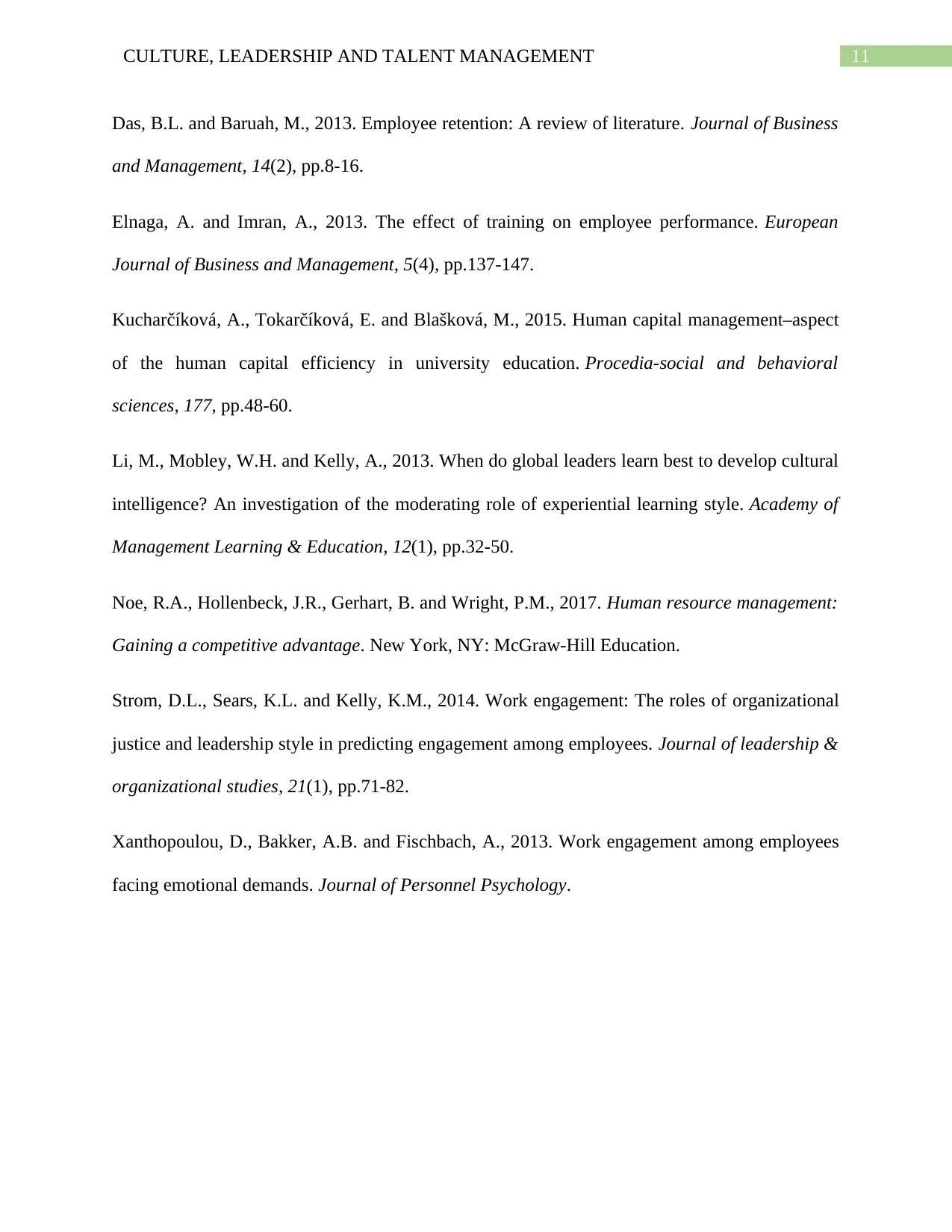
11CULTURE, LEADERSHIP AND TALENT MANAGEMENT
Das, B.L. and Baruah, M., 2013. Employee retention: A review of literature. Journal of Business
and Management, 14(2), pp.8-16.
Elnaga, A. and Imran, A., 2013. The effect of training on employee performance. European
Journal of Business and Management, 5(4), pp.137-147.
Kucharčíková, A., Tokarčíková, E. and Blašková, M., 2015. Human capital management–aspect
of the human capital efficiency in university education. Procedia-social and behavioral
sciences, 177, pp.48-60.
Li, M., Mobley, W.H. and Kelly, A., 2013. When do global leaders learn best to develop cultural
intelligence? An investigation of the moderating role of experiential learning style. Academy of
Management Learning & Education, 12(1), pp.32-50.
Noe, R.A., Hollenbeck, J.R., Gerhart, B. and Wright, P.M., 2017. Human resource management:
Gaining a competitive advantage. New York, NY: McGraw-Hill Education.
Strom, D.L., Sears, K.L. and Kelly, K.M., 2014. Work engagement: The roles of organizational
justice and leadership style in predicting engagement among employees. Journal of leadership &
organizational studies, 21(1), pp.71-82.
Xanthopoulou, D., Bakker, A.B. and Fischbach, A., 2013. Work engagement among employees
facing emotional demands. Journal of Personnel Psychology.
Das, B.L. and Baruah, M., 2013. Employee retention: A review of literature. Journal of Business
and Management, 14(2), pp.8-16.
Elnaga, A. and Imran, A., 2013. The effect of training on employee performance. European
Journal of Business and Management, 5(4), pp.137-147.
Kucharčíková, A., Tokarčíková, E. and Blašková, M., 2015. Human capital management–aspect
of the human capital efficiency in university education. Procedia-social and behavioral
sciences, 177, pp.48-60.
Li, M., Mobley, W.H. and Kelly, A., 2013. When do global leaders learn best to develop cultural
intelligence? An investigation of the moderating role of experiential learning style. Academy of
Management Learning & Education, 12(1), pp.32-50.
Noe, R.A., Hollenbeck, J.R., Gerhart, B. and Wright, P.M., 2017. Human resource management:
Gaining a competitive advantage. New York, NY: McGraw-Hill Education.
Strom, D.L., Sears, K.L. and Kelly, K.M., 2014. Work engagement: The roles of organizational
justice and leadership style in predicting engagement among employees. Journal of leadership &
organizational studies, 21(1), pp.71-82.
Xanthopoulou, D., Bakker, A.B. and Fischbach, A., 2013. Work engagement among employees
facing emotional demands. Journal of Personnel Psychology.
⊘ This is a preview!⊘
Do you want full access?
Subscribe today to unlock all pages.

Trusted by 1+ million students worldwide
1 out of 12
Related Documents
Your All-in-One AI-Powered Toolkit for Academic Success.
+13062052269
info@desklib.com
Available 24*7 on WhatsApp / Email
![[object Object]](/_next/static/media/star-bottom.7253800d.svg)
Unlock your academic potential
Copyright © 2020–2026 A2Z Services. All Rights Reserved. Developed and managed by ZUCOL.





